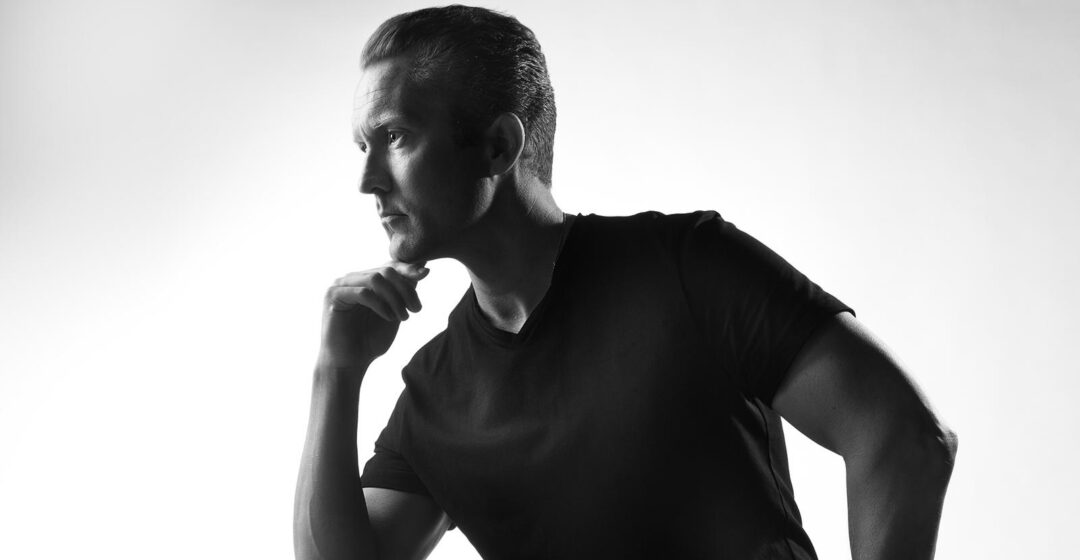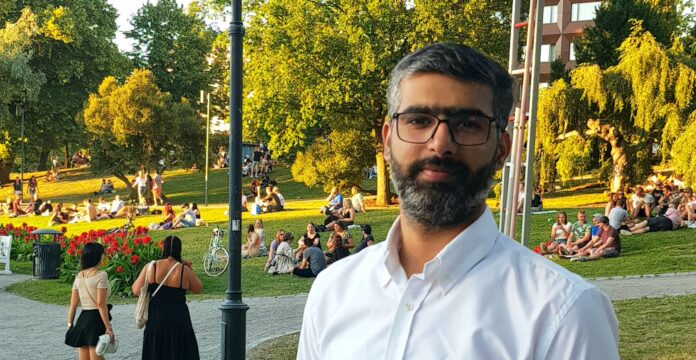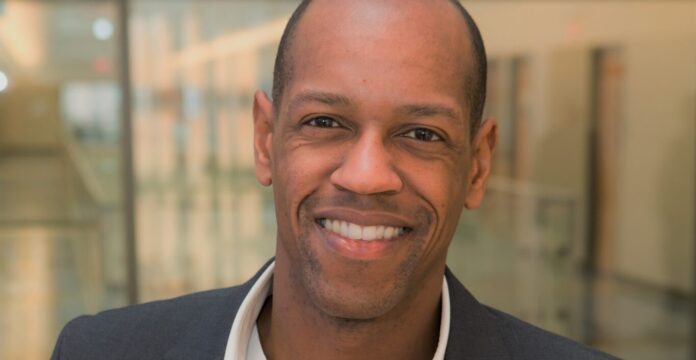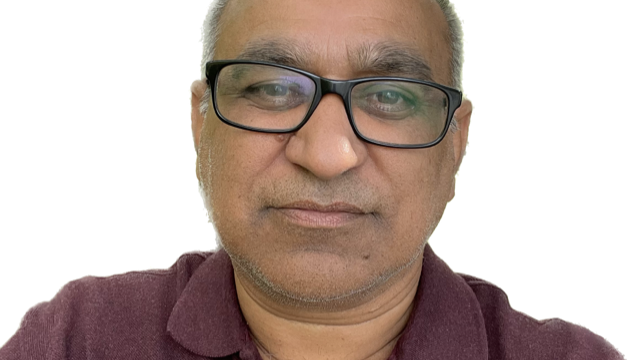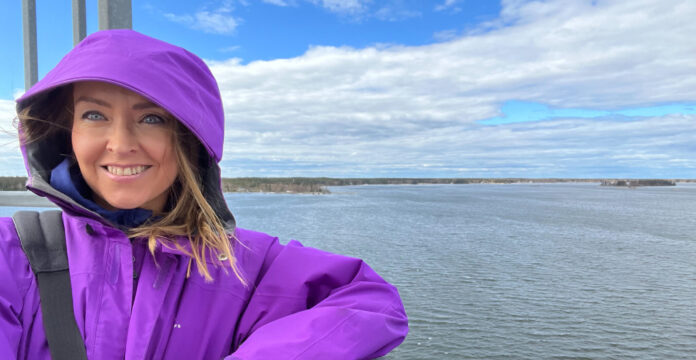Photograph by Heidi Glader.
This series introduces the members of University of Vaasa’s InnoLab research platform. Today we’re meeting Tomi Paalosmaa.
Let’s start off with introductions. Who are you, currently?
Currently I’m Tomi Paalosmaa, a Project Researcher at InnoLab. I’m 48 years old and originally from Helsinki, but I’ve lived in Vaasa for 19 years. I’m married and have a 13-year-old daughter from my previous marriage.
Concise and informative! Could you expand on your work: what does a Project Researcher do in practice?
I’m currently focused on the T-Risk project, which deals with the risk factors associated with energy transition in seafaring and aviation. I’m investigating how real-time data could be used to lower those transition risks. So, the keywords for me are ecosystems, stakeholder groups, networking and facilitating participation.
What brought you to this topic?
It’s in part because of my background. I have Master’s in engineering – in smart energy production to be exact. My previous employer was the city of Vaasa, where I worked as the project manager for urban development.
I’m an engineer, but I’m not all that technology-oriented. I’m more interested in the “softer” side of things. There’s been a lot of research into the technical, quantitative aspects of these kinds of systems. But I realized something big while working for the city: it’s very important to involve people. Businesses, schools, individual citizens… To make everyone understand they have a role in meeting our sustainability goals. Real-time data systems can help those actors, be they businesses or citizens, to see their position in the big picture.
So, you’re more involved with people than with instruments?
Well, both… But yes. Even though I studied a very technical field and had to understand how that technology works, I knew I wanted to work where the end user meets the technology. What happens there, how they resonate and what becomes of that encounter.
That’s an interesting outlook for an engineer. Can you tell us about your journey to this point?
I have a long history of working with electronic media. I started at the television channel Nelonen when it launched in 1997. I quickly moved to working with the channel’s movie catalogue and became the executive producer responsible for movies and children’s programmes. From Nelonen I went into the film distribution business: I identified strong titles, bought rights to them and sold them to television broadcasters, on Blu-ray and DVD… It was very much a sales job – working with mental images, trying to find an attractive angle for the movie. I had my own company for a few years, but I got out of that business when online distribution became a thing. Big companies like Netflix and HBO made things really difficult for us small distributors.
So, I had to make a choice: either move back to Helsinki where the business is concentrated, or look for a new direction. I was in my fourties, but decided to be brave and go back to studying. I heard a lot of sceptical comments about it!
I initially started my studies at VAMK (Vaasa University of Applied Sciences), first in the ICT programme and then switched it to energy and environmental engineering. Once I had my Bachelor’s degree, I immediately applied to the University of Vaasa’s Master’s programme in Smart Energy. I started working for the city during those studies. And look! Now I am back at the university again.
Maybe all this goes to show why I’m more interested in people than in hardcore bytes-and-data technology. It’s immensely important, but I consider myself better at selling ideas, mental images, interest and motivation. It’s what I’ve always worked with, and it is also important.
How was it going from media to studying engineering? It sounds like a big leap.
Well… It was a bit daunting at first, I was worried I wouldn’t find anything that would really fit me. We all went through personality tests at VAMK, and they told me I was the most “non-engineer-like” student they had ever met – that I shouldn’t even be studying engineering! But when I got into the Smart Energy programme at the university I realized I had always been interested in environmental issues. I spend my free time in the nature, I follow the news and I’m worried – well, who isn’t? – about the climate. So, I trusted I would find my place eventually.
As my studies went on, I noticed I looked at things from a different perspective from the others: I was thinking how a layperson could find the same interest and enthusiasm as I have? I had feared I had wasted the 20 years I spent in media, that I couldn’t use any of that experience. Instead I discovered I could use a lot of it! That realization was very motivating.
After you graduated you worked for the city. Why did you come back to the University and join InnoLab?
A lot of things. When I first contacted InnoLab to discuss the T-Risk position, I felt we were kindred spirits. I saw I was talking with people who want to research, to develop, to take things forward and find new ways to do things. It was different in my previous job: you can’t always keep changing the course of the ship, the city doesn’t have the resources for that. The T-Risk project also touches upon a lot of the themes I’ve worked on, like energy transition, sustainability and data use. So, joining InnoLab was a no-brainer.
Lastly, I’ve been dreaming of getting my doctorate, but it kept getting buried under various projects in my previous job. At the time I quit I had 30 projects to run, and doing my PhD on the side was impossible.
Was getting a doctorate always your goal?
I’ve thought about it for a long time, but I had already given up on it. But when I started studying again… Learning new things suddenly filled something in me like never before. I simply fell in love with it, it was a whole new world for me. And so, little by little, the idea of getting a PhD emerged again.
I’ve always admired people who learn new things and teach, that thirst for knowledge. I had studied communication and international sales earlier, before going into the media business… But maybe I always felt like hadn’t gone far enough, hadn’t really tested my mettle.
And your dissertation – what is it about?
Originally my research plan was about using smart city solutions in transportation, things like smart mobility, e-mobility, car sharing and so forth. That didn’t really work out, the plan wasn’t clear enough. Now I’m more focused on the use of real-time data… But I’m currently working on the plan.
What will you do post-defence – what will become of Dr. Paalosmaa?
I haven’t made any specific plans for that yet. Now that I have a chance to focus, I want to work full-throttle and decide on the future when I have my doctorate. Sometimes it’s good to just go with the flow.
Well, you do have a history of on-the-spot decisions!
I’ve always been a bit impulsive, just winging it and hoping for the best. So far it’s worked out well for me!
That said, I can also be determined and ambitious. I’m a perfectionist in my work, I don’t like to sit on things but rather move forward efficiently. That’s what I like about the T-Risk project: it’s already in progress which puts some pressure on me – I work well under pressure.
I’m beginning to get the idea. How about your free time, do your hobbies reflect those personality traits?
Well… I try to take care of myself. I go to the gym two or three times per week, usually before work around five or five thirty. I’ve been going for 33 years. I’m actually a trained physiotherapist, it’s one of my very early educations from before I went to work in media.
I also like reading, spending time outdoors… I still watch movies if I find the time. I’ve calculated I have seen around 13,000 movies over the years, and 3,000–4,000 of them more than once.
Culinary arts are also very important to my partner and I. My father was a gourmand and he passed his appreciation of cooking and good food onto me. We also like to travel, and… Listening to me you would not guess it, but I’m passionate about foraging mushrooms!
And, of course, I try to be a good, engaged father to my daughter: be interested in her life, help her out with school work and so on.
That sounds like a lot!
It is important for me to have a private life that looks and feels like my own. I try to find things that give me energy rather than take it away – doing those things on my free time makes my work possible.
I’m sure we could all use some extra energy. Any recommendations?
Physical activity, be it walking or skiing or whatever… I used to go to the gym in evenings, but I’ve recently begun waking up early and going in the morning. I’ve come to see it gives me a huge boost of energy, it brings me fully into a “thinking mode”.
From the perspective of Tomi’s coworkers: What makes you appreciate him as a colleague?
“I had the pleasure to work with Tomi for a few years, and it was one of the most interesting times in my working history. Tomi’s business expertise was outstanding, and his fearless approach always inspired us all.“
“Tomi has extensive experience and, consequently, an incredible variety of skills. It is fun to work with Tomi, his sense of humor is awesome!”
“Tomi has a unique talent to see the big picture as well as understand the parts and partners needed to reach the goal. He is a very reliable and polite team player, and an excellent writer. Tomi is always prepared to help, and it’s a pleasure working with him!”
